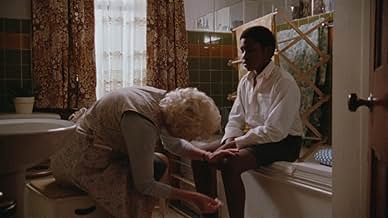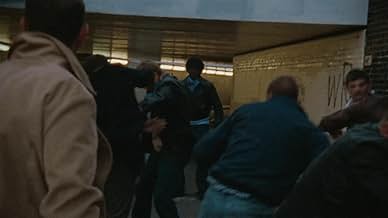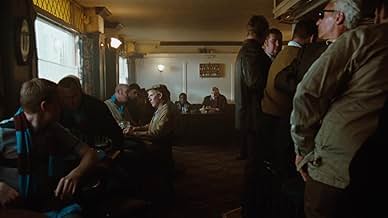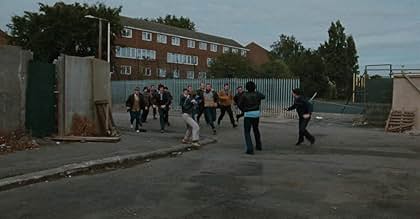Cass
- 2008
- 1 घं 48 मि
IMDb रेटिंग
6.4/10
6.8 हज़ार
आपकी रेटिंग
अपनी भाषा में प्लॉट जोड़ेंAn orphaned Jamaican baby is adopted by an elderly white couple and brought up in an all white area of London and becomes one of the most feared and respected men in Britain. Based on a true... सभी पढ़ेंAn orphaned Jamaican baby is adopted by an elderly white couple and brought up in an all white area of London and becomes one of the most feared and respected men in Britain. Based on a true story.An orphaned Jamaican baby is adopted by an elderly white couple and brought up in an all white area of London and becomes one of the most feared and respected men in Britain. Based on a true story.
- निर्देशक
- लेखक
- स्टार
फ़ीचर्ड समीक्षाएं
This is the film adaptation of how one Carol "Cass" Pennant rose from being an orphaned black boy, adopted by a white middle aged couple, to being a leader of the notorious football hooligan firm, The ICF.
You know what's funny? That one of the most well known names in the world of British Football Hooliganism is the last in the line of football violence related medium's. Had this film, and Cass' book been ten years ago, it surely would have had a greater impact. Going back to when the Brimson Brothers decided to write about a topic nobody but those involved understood in the mid 90s {source Everywhere We Go}, there has been books galore from what seems almost every footie hoolie mob going. Throw in all the film's and documentaries that have found a distributor since Gary Oldman starrer, The Firm 1988 {ID, Football Factory, Green Street and The Rise Of A Footsoldier etc}, well it's a pretty exhausted subject. So much so, that it's only really those of a certain age, and of an inclination to the topic, that can get much out of what essentially feels like a belated cash in.
In Cass' favour is that Pennant does have an interesting back story from which to launch from. His upbringing, and early struggles with racism is nicely dealt with. It put me in mind with Caroline Gall's book about hooligan outfit Zulu Warriors, where the black and white mix of races became united at football matches {see what I mean about this film trailing in others wake's}. So it be with Cass, it does have a bit of heart to go with its obvious shouty muscle. But here in lies another problem with the film, where does it want to go? What is it asking or telling us? Is Cass conflicted emotionally? Or is he merely using his troubled youth as an excuse for pounding some poor Newcastle fans head in? Pertinent questions that aren't properly answered I feel. There's a nice sequence with Cass in prison, as his racial standing is called into question by a patois spouting convict, but outside of that the film flits between being about a troubled man to an all punching thug. Something that, as I mentioned earlier, is pretty much old hat now guv.
Nonso Anozie does good work as Pennant, and Natalie Press continues to be effective in these type of roles {see Fifty Dead Men Walking}, while the underused Tamer Hassan asserts his scenes in another typecast role. I personally enjoyed the film because I can see that those involved thought a good film could be made about the matters at hand, but I'm afraid that anyone hoping for something fresh are in for one big let down. 6/10
You know what's funny? That one of the most well known names in the world of British Football Hooliganism is the last in the line of football violence related medium's. Had this film, and Cass' book been ten years ago, it surely would have had a greater impact. Going back to when the Brimson Brothers decided to write about a topic nobody but those involved understood in the mid 90s {source Everywhere We Go}, there has been books galore from what seems almost every footie hoolie mob going. Throw in all the film's and documentaries that have found a distributor since Gary Oldman starrer, The Firm 1988 {ID, Football Factory, Green Street and The Rise Of A Footsoldier etc}, well it's a pretty exhausted subject. So much so, that it's only really those of a certain age, and of an inclination to the topic, that can get much out of what essentially feels like a belated cash in.
In Cass' favour is that Pennant does have an interesting back story from which to launch from. His upbringing, and early struggles with racism is nicely dealt with. It put me in mind with Caroline Gall's book about hooligan outfit Zulu Warriors, where the black and white mix of races became united at football matches {see what I mean about this film trailing in others wake's}. So it be with Cass, it does have a bit of heart to go with its obvious shouty muscle. But here in lies another problem with the film, where does it want to go? What is it asking or telling us? Is Cass conflicted emotionally? Or is he merely using his troubled youth as an excuse for pounding some poor Newcastle fans head in? Pertinent questions that aren't properly answered I feel. There's a nice sequence with Cass in prison, as his racial standing is called into question by a patois spouting convict, but outside of that the film flits between being about a troubled man to an all punching thug. Something that, as I mentioned earlier, is pretty much old hat now guv.
Nonso Anozie does good work as Pennant, and Natalie Press continues to be effective in these type of roles {see Fifty Dead Men Walking}, while the underused Tamer Hassan asserts his scenes in another typecast role. I personally enjoyed the film because I can see that those involved thought a good film could be made about the matters at hand, but I'm afraid that anyone hoping for something fresh are in for one big let down. 6/10
Sure Cass is about hooliganism and has enough of that to fit the bill, but this is good enough to be mainstream viewing.
We found it much better than we expected: good central performances and a great arc lift this from its genre to something better.
It really looks and sounds (the language is what is was, every second word is filth, but then it was) like the British East End 80s down to the council flat doors.
I can honestly recommend this a good well-made film about life in Britain in the early 80s, it is a little light on production and directing values, it is shot too simplistically, but the story is well delivered, it is probably not for your granny (unless she's a hard nut), but deserves a wider audience than just 20 year old males with a footie hard on.
We found it much better than we expected: good central performances and a great arc lift this from its genre to something better.
It really looks and sounds (the language is what is was, every second word is filth, but then it was) like the British East End 80s down to the council flat doors.
I can honestly recommend this a good well-made film about life in Britain in the early 80s, it is a little light on production and directing values, it is shot too simplistically, but the story is well delivered, it is probably not for your granny (unless she's a hard nut), but deserves a wider audience than just 20 year old males with a footie hard on.
Excellent biopic and and great acting. The usual familiar British faces with your typical violence and swearing. Cass is played well and is a good portrayal of 1980s Britain. If you like football hooligan films you will like this.
With The Football Factory still reverberating in the memory, it's difficult to get as excited about a film like Cass as one would like; a piece living in the still-recent shadow of such a film whilst calling on direct influence from the likes of 2005's Green Street as well as bits and pieces of an older crime film, albeit disconnected from hooliganism, in the form of De Palma's Carlito's Way. Indeed, Cass' director is a certain Jon Baird; a man who worked on Green Street as an associate producer - his film here formulating into a similar tale of a "white crow" and their consequent exposure to a world around them they are inherently alien to. This, before undergoing a gradual inception into it. It all smells suspiciously of said example's Elijah Wood character, an American getting lost amidst the sociological norms of a hooligan-dominated zone and having to undergo this process of initiation so as to get by. A similar framework of someone as much-an outcast to their surroundings getting involved, before realising the nature of one's ways and one's life, is told here, only over the space of about thirty years and not as engagingly.
The film follows that of true-to-life criminal-come-hooligan turned author Cass Pennant; a man whose tale here is as true as they tell us it is, and yet doesn't carry that naturalistic sense that it is someone's life actually progressing from one point to another. Told in glaringly episodic fashion, a fresh popular song peppering the soundtrack every time the era jumps forward, Nonso Anozie plays the titular lead: a man of Jamaican descent adopted at a young age by a white London couple in the 1960s, and brought up as their own in decent, friendly home-set surroundings. As a youngster, he is marginalised and ridiculed for his colour; a safe haven arriving in the form of a local public house practically run by the fans of West Ham United, whom welcome him in if it means he's a fan of the team and help him out when he runs into those racists outside of hours. This sense of unity is epitomised by the singing in unison those within carry out; football shirts and scarves in the club's colours reiterating this sense of being at one. In an attempt to instill an early sense of where we're at, we observe The Football Factory's own Tamer Hassan doing what the character of Billy Bright did in Nick Love's said 2004 film, when pub-set shenanigans give way to the intimidating of a young kid who thinks he can intermingle with those above his weight.
Cass is apprehensive of going to football to begin with; not even his father's reiteration that the stars of the day and certain World Cup winners will be there appears to convince him, but he rides it out and then discovers a taste for what lurks beneath the following of a football team. Thus that of what we see of Cass' life is launched, his descent through hooliganism and organised violence; a world in which the attraction of a footballing 'firm' facing off against another is more appealing than the match itself. West Ham's biggest rivals in this regard are Leeds United, not out of geography nor the fact they are both of an immensely skilled nature alá the Real Madrid-Barcelona ties, but because these two fight the hardest.
What transpires are several 'bits' and pieces of Pennant's life: his first feel of football violence; his going to prison; his meeting of a girl; his getting wind of a business venture, none of it much more than slightly interesting and all of it propped up with a lacklustre script seeing dialogue made up of insults and lots of four letter words predominantly coming from that of the males therein with meek moral out-linings accompanying spots of common sense exuded by the females. Director Baird strikes us as someone doing their utmost to make a good film, maturely; his veering off down a route to encompass a sub-plot inspired by Carlito's Way, as well as the fact Cass is later released from prison to the same sound of pomp and circumstance that saw Alex De Large enter prison in Kubrick's A Clockwork Orange, suggests the man has seen his fair share of films; enjoyed them and desperately wanted to make his own whilst pay homage, but there is no cumulative whole around which everything gels. Its politics may be in the right place but the film's overall feel as you both watch it and absorb it is that of unsmooth; as if it's fumbling around in the dark for the right buttons, sometimes finding them, but doing its utmost overall to do the right thing.
The film follows that of true-to-life criminal-come-hooligan turned author Cass Pennant; a man whose tale here is as true as they tell us it is, and yet doesn't carry that naturalistic sense that it is someone's life actually progressing from one point to another. Told in glaringly episodic fashion, a fresh popular song peppering the soundtrack every time the era jumps forward, Nonso Anozie plays the titular lead: a man of Jamaican descent adopted at a young age by a white London couple in the 1960s, and brought up as their own in decent, friendly home-set surroundings. As a youngster, he is marginalised and ridiculed for his colour; a safe haven arriving in the form of a local public house practically run by the fans of West Ham United, whom welcome him in if it means he's a fan of the team and help him out when he runs into those racists outside of hours. This sense of unity is epitomised by the singing in unison those within carry out; football shirts and scarves in the club's colours reiterating this sense of being at one. In an attempt to instill an early sense of where we're at, we observe The Football Factory's own Tamer Hassan doing what the character of Billy Bright did in Nick Love's said 2004 film, when pub-set shenanigans give way to the intimidating of a young kid who thinks he can intermingle with those above his weight.
Cass is apprehensive of going to football to begin with; not even his father's reiteration that the stars of the day and certain World Cup winners will be there appears to convince him, but he rides it out and then discovers a taste for what lurks beneath the following of a football team. Thus that of what we see of Cass' life is launched, his descent through hooliganism and organised violence; a world in which the attraction of a footballing 'firm' facing off against another is more appealing than the match itself. West Ham's biggest rivals in this regard are Leeds United, not out of geography nor the fact they are both of an immensely skilled nature alá the Real Madrid-Barcelona ties, but because these two fight the hardest.
What transpires are several 'bits' and pieces of Pennant's life: his first feel of football violence; his going to prison; his meeting of a girl; his getting wind of a business venture, none of it much more than slightly interesting and all of it propped up with a lacklustre script seeing dialogue made up of insults and lots of four letter words predominantly coming from that of the males therein with meek moral out-linings accompanying spots of common sense exuded by the females. Director Baird strikes us as someone doing their utmost to make a good film, maturely; his veering off down a route to encompass a sub-plot inspired by Carlito's Way, as well as the fact Cass is later released from prison to the same sound of pomp and circumstance that saw Alex De Large enter prison in Kubrick's A Clockwork Orange, suggests the man has seen his fair share of films; enjoyed them and desperately wanted to make his own whilst pay homage, but there is no cumulative whole around which everything gels. Its politics may be in the right place but the film's overall feel as you both watch it and absorb it is that of unsmooth; as if it's fumbling around in the dark for the right buttons, sometimes finding them, but doing its utmost overall to do the right thing.
As a true story it's never going to feel like a Hollywood blockbuster, but compared to something like The Krays I think it stacks up superbly. This film feels real and as a side point the story should be respected, racism was rife in football at that time so the 'achievement' of Cass is even more remarkable.
I guess I'm a bit biased as I've met the man, met his wife and met his son (who had an extra role in Green Street).
Summary is this; a good film on a really interesting life and even though the narrative is grim, enough in the film to entertain, definitely recommend.
I guess I'm a bit biased as I've met the man, met his wife and met his son (who had an extra role in Green Street).
Summary is this; a good film on a really interesting life and even though the narrative is grim, enough in the film to entertain, definitely recommend.
क्या आपको पता है
- ट्रिवियाThe extras in the fight scenes are people who were nearly exclusively those who are involved or were involved in the London underworld apart from certain stunt-men. after setting up the Leeds fight scene for most of the day the extras had had one too many beers got a little carried away and one of the stars got his head cut open with a punch. at that Cass and some others had to step in as to this day they work security at night clubs and are used to confrontations.
- गूफ़When the two ladies are talking outside a house with Cass in the pram, the subtitle shows 'Slade Green, London 1958'. Slade Green is now in the London Borough of Bexley, but in 1958 would have been part of Kent as the current Greater London was not formed until 1965. Also, the house types don't exist and have never existed in the Slade Green area, neither does the blue railway footbridge. Slade Green would have in 1958 consisted of a couple of farms, a railway depot, some railway worker houses and some newer council houses.
- साउंडट्रैकThe Israelites
Written and performed by Desmond Dekker
टॉप पसंद
रेटिंग देने के लिए साइन-इन करें और वैयक्तिकृत सुझावों के लिए वॉचलिस्ट करें
- How long is Cass?Alexa द्वारा संचालित
विवरण
- रिलीज़ की तारीख़
- कंट्री ऑफ़ ओरिजिन
- आधिकारिक साइट
- भाषा
- इस रूप में भी जाना जाता है
- Untitled Cass Pennant Project
- फ़िल्माने की जगहें
- The Britannia, 2 Plaistow Grove, Stratford, लंदन, इंग्लैंड, यूनाइटेड किंगडम(South Bank Crew pub - internals and externals)
- उत्पादन कंपनियां
- IMDbPro पर और कंपनी क्रेडिट देखें
बॉक्स ऑफ़िस
- बजट
- £10,00,000(अनुमानित)
- दुनिया भर में सकल
- $2,41,369
- चलने की अवधि1 घंटा 48 मिनट
- रंग
- ध्वनि मिश्रण
- पक्ष अनुपात
- 1.66 : 1
इस पेज में योगदान दें
किसी बदलाव का सुझाव दें या अनुपलब्ध कॉन्टेंट जोड़ें































